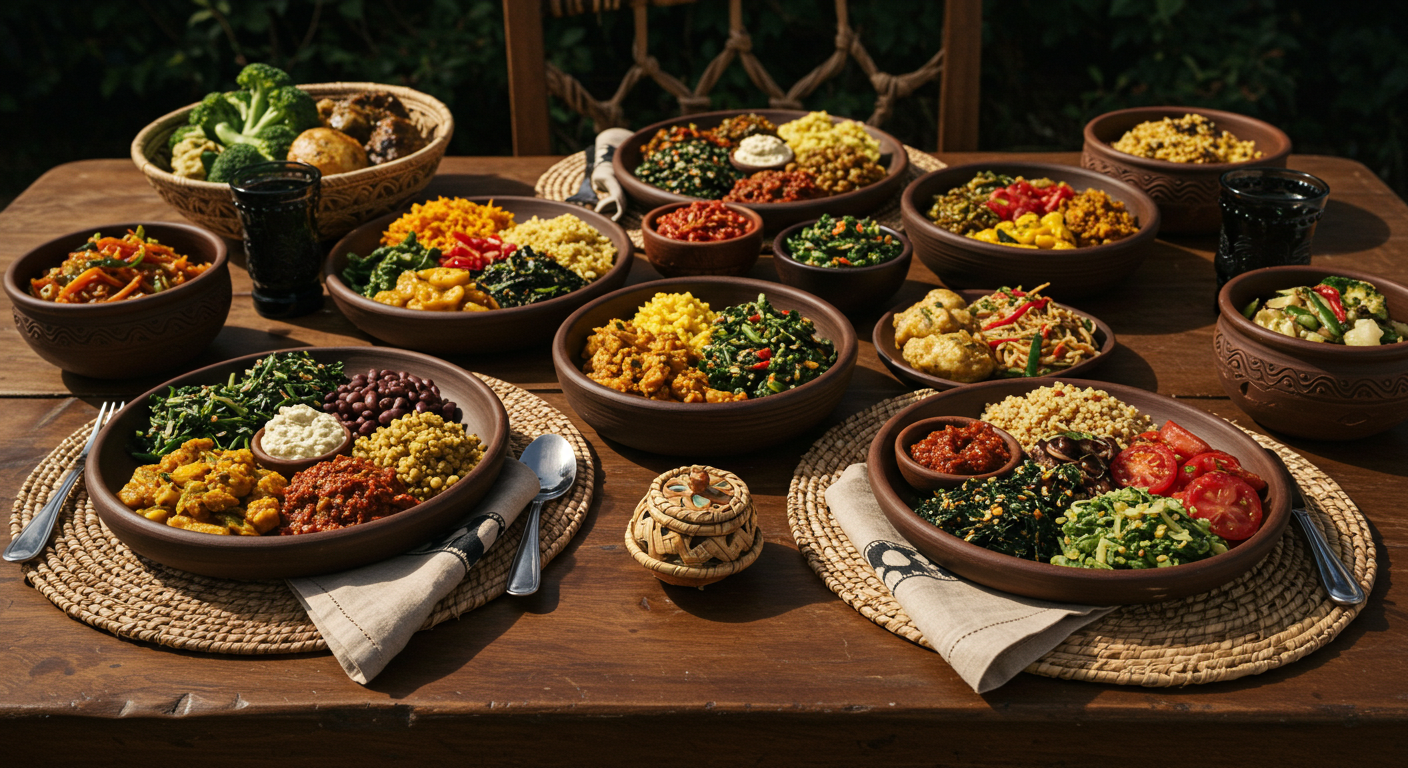The surge of interest in plant-based diets around the world is often credited to environmental concerns, health consciousness, and ethical considerations. However, what many don’t realize is that African cuisine—long before modern veganism—has always been rich in plant-based traditions. From hearty stews to vegetable soups, tuber-based meals to fermented grains, African plant-based dishes offer a holistic model of sustainable, nutritious, and culturally rich eating.
Incorporating African ingredients into modern plant-based meal plans is more than a culinary choice; it is an act of reclaiming ancestral wisdom, supporting biodiversity, and improving health outcomes in communities facing rising rates of lifestyle diseases.
Why African Plant-Based Meals Matter
Unlike some modern vegan diets that rely heavily on meat substitutes, African plant-based meals are rooted in whole foods: legumes, vegetables, roots, tubers, seeds, and fermented grains. These dishes provide high fiber, essential minerals, antioxidants, and plant proteins—making them ideal for managing blood sugar, heart health, weight, and gut health.
Moreover, many of these meals are built around seasonal and local produce, reducing the carbon footprint and ensuring freshness. In countries like Ethiopia, Nigeria, Ghana, and Kenya, plant-based meals are not trends—they are culinary norms in both rural and urban homes.
Sample 7-Day African Plant-Based Meal Plan
Let’s explore a full week’s worth of African-inspired, nutritionally balanced, plant-based meals. These meals are flavorful, affordable, and easily adaptable to various dietary needs.
Day 1 (West Africa Focus – Nigeria)
Breakfast: Pap (ogi) with date syrup and coconut milk
Lunch: Efo riro (spinach stew) with pounded yam (from cocoyam or yam flour)
Dinner: Beans pottage (ewa riro) with fried plantain
Snack: Tiger nut and ginger smoothie
Day 2 (East Africa Focus – Ethiopia)
Breakfast: Injera with shiro wat (chickpea stew)
Lunch: Gomen (collard greens) with lentils and brown rice
Dinner: Kitcha firfir (spiced flatbread with berbere and oil)
Snack: Spiced roasted peanuts
Day 3 (North Africa Focus – Morocco/Algeria)
Breakfast: Barley porridge with dried fruits and almond milk
Lunch: Vegetable tagine with couscous
Dinner: Lentil and chickpea harira soup
Snack: Dates with mint tea
Day 4 (Southern Africa Focus – Zambia/South Africa)
Breakfast: Millet porridge with moringa and banana
Lunch: Pumpkin leaves (chibwabwa) with nshima (cornmeal fufu)
Dinner: Bean stew with sweet potato mash
Snack: Dried baobab fruit
Day 5 (Fusion Day)
Breakfast: African granola with baobab, dried pawpaw, and sesame seeds
Lunch: Jollof rice made with brown rice and tofu suya
Dinner: Okra stew with fonio fufu
Snack: Coconut and tiger nut balls
Day 6 (Fasting Friendly)
Breakfast: Herbal tea with boiled sweet potato slices
Lunch: Palm oil vegetable soup with cassava mash
Dinner: Spiced lentil soup with hibiscus leaf stir-fry
Snack: Roasted groundnuts
Day 7 (Celebration Feast)
Breakfast: Spiced millet pancakes with zobo syrup
Lunch: Yam porridge (asaro) with avocado slices
Dinner: African vegetable stir-fry with plantain chips
Snack: Tamarind juice popsicles
Nutritional Highlights of the Plan
Protein: Legumes (beans, lentils, chickpeas), tofu, nuts, seeds.
Carbohydrates: Root vegetables, whole grains like millet, fonio, brown rice.
Fats: Coconut, sesame, avocado, unrefined palm oil.
Fiber: Leafy greens, tubers, fruits, and fermented foods.
Vitamins & Minerals: Baobab (vitamin C), moringa (iron and calcium), leafy greens (vitamin A, folate).
This balance supports energy, mental clarity, immunity, and digestive health.
Adapting for the Diaspora or Western Kitchens
Not all African ingredients are available everywhere, but many can be substituted:
Fonio → quinoa
Ugu leaves → spinach
Tigernuts → almonds
Baobab → camu camu or lemon with chia seeds
Palm oil → red sustainable unrefined palm oil or coconut oil
Use your local farmers’ market or African grocery store to source ingredients and get creative with substitutions.
Conclusion: African Plant-Based Living is the Future
Far from being a dietary fad, African-inspired plant-based eating offers a deep, healthful way of life. It's about eating whole, local, seasonal foods in a manner that respects the land and traditions. It emphasizes diversity—of ingredients, of flavors, and of cultures. In a time when global food systems are strained and chronic illnesses abound, returning to the plant-based principles embedded in African food culture is both a nourishing and revolutionary act.



